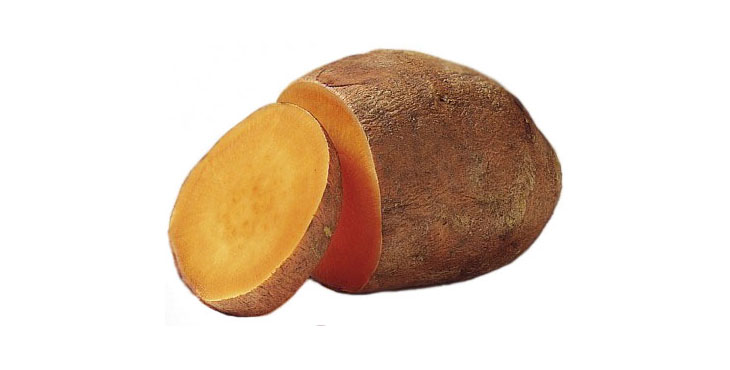Sweet Potato: Sweet Nutrition
Have you ever wondered how sweet potatoes compare to white potatoes, from a nutritional standpoint? Do you have diabetes and believe you shouldn’t eat sweet potatoes? If so, here is some “sweet” news for you.
Not only can those with diabetes eat sweet potatoes, but research has shown that this fall favorite may actually be helpful to regulate blood sugar. Sweet potatoes offer a wealth of nutritional and health benefits that exceeds that of their white potato counterparts.
These are just a few of the nutrition attributes of sweet potatoes:
- Good source of fiber (For more on fiber click here.)
- Keeps bowels regular, which helps prevent colorectal cancer
- Helps lower cholesterol
- Decreases rate of absorption; helpful in controlling blood sugar
- Keeps you full between meals; which can be helpful in managing weight
- Blood sugar lowering effect
- May help to regulate blood sugar levels in people with type 2 diabetes and decrease insulin resistance; click here and here for some research on the diabetes friendly properties of sweet potatoes
- A complex carbohydrate
- A source of steady energy that minimizes sugar and insulin highs and lows
- Provides beta-carotene (a phytonutrient that gives it its’ orange color)
- Has anti-inflammatory properties potentially decreasing the risk of chronic disease; essential for eye health
- Good source of vitamins C and B6 (pyridoxine)
- Important for your immune system, nervous system, and metabolism
- Vitamin C increases iron absorption, promotes wound healing, and helps fight infection
- Provides the minerals potassium, calcium, magnesium, and manganese
- Manganese helps maintain normal blood sugar control and optimal thyroid function
- Low calorie (lower than white potatoes)
- 103 calories for one medium size potato (about the size of baseball or computer mouse). A medium white potato provides 145 calories. Click here for complete nutrition information on sweet potatoes from the USDA National Nutrient Database.
- Naturally fat and cholesterol free/Heart Healthy
How to eat them:
Steamed or baked to maximize bioavailability [rate of absorption] of nutrients
If buying canned choose the no sugar or syrup added versions
Add a very small amount of fat (butter, margarine, oil) to maximize the absorption of beta-carotene/vitamin A
There are so many ways to incorporate sweet potatoes into your diet that don’t require sugar-dense marshmallows. Here are some Healthy ways to enjoy sweet potatoes throughout the year!
For additional help contact your local VA PACT dietitian nutritionist, or MOVE! /TeleMove weight management program. You can also visit NutritionVA.gov for educational handouts.
Laure Moluskie is a registered dietitian nutritionist, medical nutrition therapist. She has 20 years of experience in medical nutrition therapy in the areas of weight management, diabetes, renal (kidney) disease and dialysis, disease prevention, long-term care, geriatrics, home health, technical writing and research. She currently works with the medical team at a VA hospital in Maryland where she helps to honor America’s Veterans as heroes by providing the highest quality health care.
Topics in this story
More Stories
The Social Security Administration is hoping to make applying for Supplemental Security Income (SSI) a whole lot easier, announcing it will start offering online, streamlined applications for some applicants.
Yusuf Henriques, an Army Veteran and former combat medic, is the founder and CEO of IndyGeneUS AI, a genomics company on a mission to improve health equity by increasing representation of women and racial minorities in clinical trials.
Online shopping scams are the riskiest scam for Veterans, with 77.3% of reports confirmed losing money when targeted by this scam.









Yes, I agree; people with diabetes can and should enjoy sweet potatoes. They are delicious and nutritious. I hope that readers of this blog don’t think that white potatoes are less nutritious or wholesome. As a registered dietitian nutritionist and a certified diabetes educator, I encourage my patients to enjoy ALL types of potatoes in reasonable amounts. White potatoes are affordable, versatile and host to numerous nutrients, including the under-consumed potassium and fiber. A medium white potato contains more than 900 mg of potassium and nearly 4 g of fiber. White potatoes – like other white vegetables and fruits – have colorless phytonutrients, such as quercetin, which is studied for its potential anticancer effects (http://www.aicr.org/foods-that-fight-cancer/foodsthatfightcancer_garlic.html). I hope that people with diabetes (or without) will enjoy appropriate amounts of both white potatoes and sweet potatoes without guilt. Jill Weisenberger, MS, RDN, CDE, FAND on behalf of the Alliance for Potato Research and Education. http://www.apre.org/resources/potatoperfectplate-page12.pdf
it may not be the best way to eat them,but I love mashed sweet potatoes with just a touch of brown sugar and a touch and a half of cinnamon in them. YUM YUM! I
How about yams in comparison?
How about eating sweetie potatoes and yams raw which is how I like them?